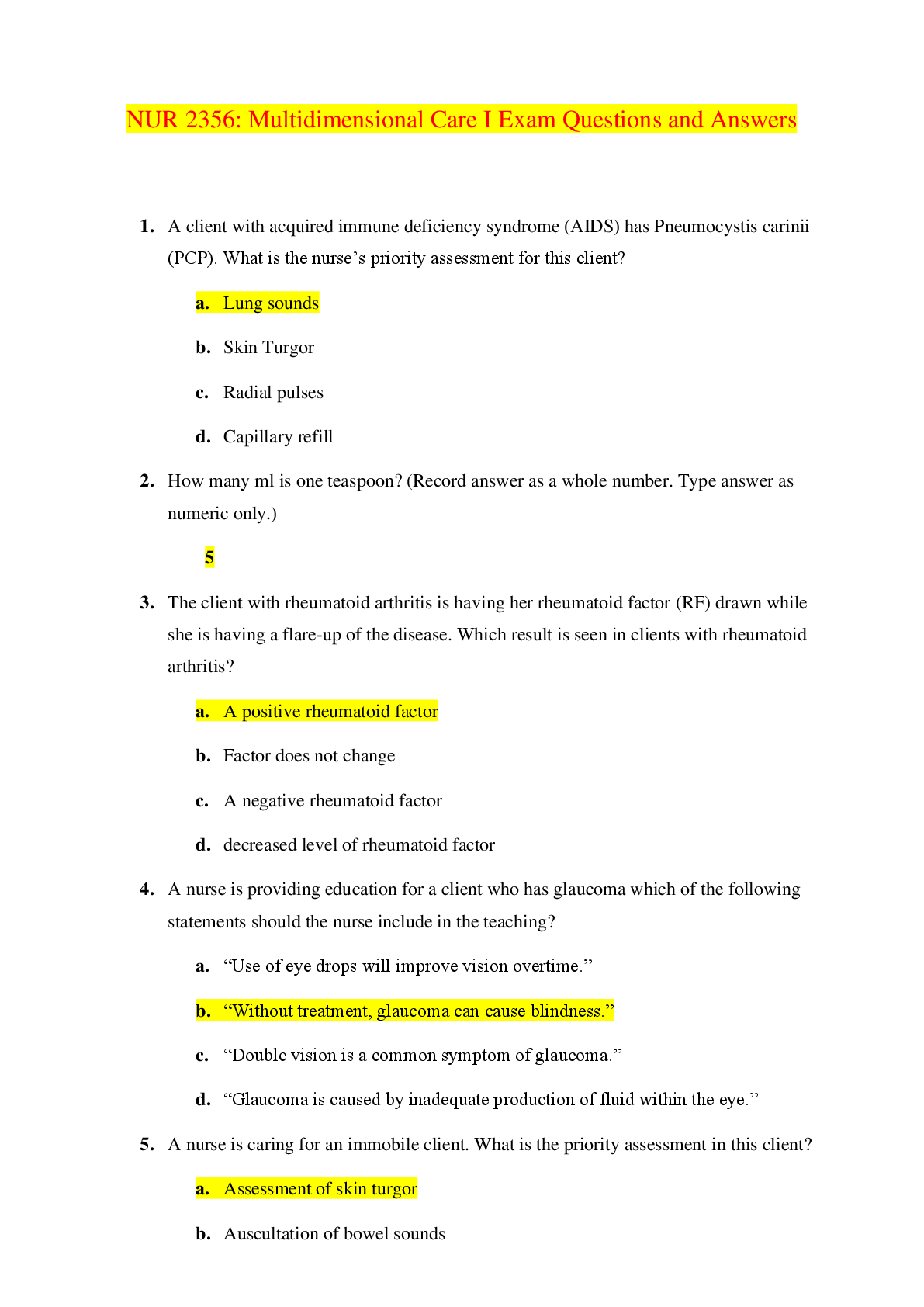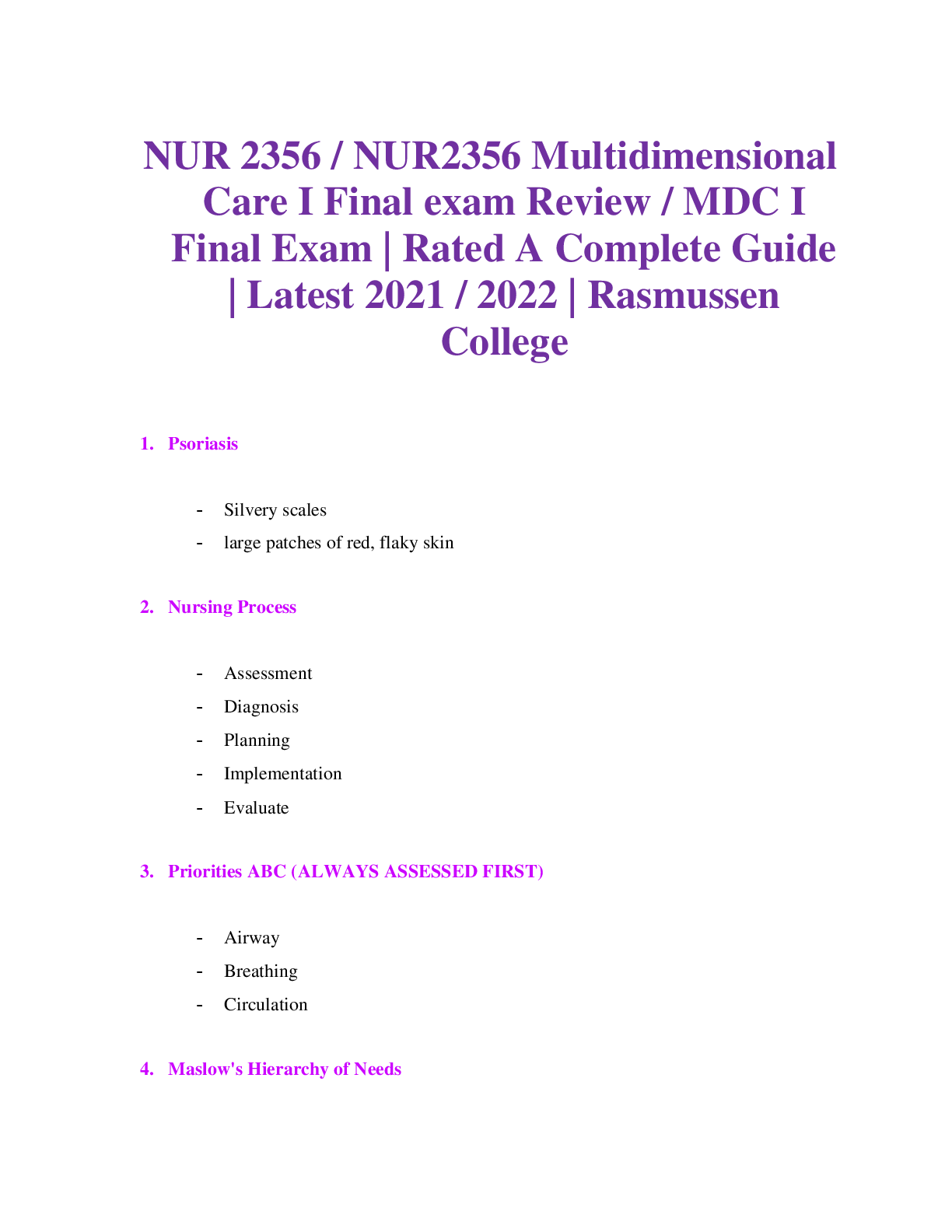*NURSING > Final Exam Review > NURS 6531N Midterm Final comprehensive Exam Review (Week 1-6) Spring 2020 (All)
NURS 6531N Midterm Final comprehensive Exam Review (Week 1-6) Spring 2020
Document Content and Description Below
NURS 6531 Midterm Exam Review (Week 1-6) **Save for Final comprehensive Exam Review** Competencies of Advanced Nurse Practitioners How to apply advanced practice nursing competencies to clinica ... l settings Upon completion of a nurse practitioner program, nine core competencies were defined as the foundational components instilled in the graduate regardless of the areas of specialty. These competencies consist of: 1. Scientific foundation These competencies ensure that nurse practitioners graduate with a comprehensive background in medical sciences. All nurse practitioner students are required to take foundational pathophysiology and pharmacology, but depending on their specialty, they may take additional courses. o Thinks critically about data and applies this evidence to improving practice. o Allows knowledge from the humanities and other disciplines to inform one’s work in nursing. o Incorporates research findings to enhance practice methods and patient outcomes. o Creates fresh evidence-based approaches and techniques, paying thought to research findings, core theory, and experience from practice. 2. Leadership Leadership competencies focus on professional accountability, scholarship, and advocacy. These skills ensure that nurse practitioner students understand their scope and standards of practice and that they are prepared to lead healthcare teams. The leadership competencies also encompass cultural sensitivity, engagement in professional organizations, and communication skills. o Embraces high leadership opportunities to facilitate change. o Liaises effectively between various parties (e.g., healthcare teams, patients, community, policy advocates) in efforts to improve healthcare. o Applies critical and reflective thinking to one’s leadership. o Acts as an advocate for resource-efficient, cost-effective, and quality care. o Elevates practice by incorporating innovations. o Has excellent oral and written communication skills. 1 o Joins professional associations, advocacy groups, and other activities to improve healthcare. 3. Quality Quality care, as defined by the NONPF, refers to the degree to which health services increase the desired health outcomes consistent with professional knowledge and standards. Quality competencies focus on understanding how to access and use information databases and how to critically evaluate research findings. The quality core competencies include the following: o Applies the best and most contemporary research findings to clinical practice. o Considers the complex relationships between cost, safety, access, and quality in healthcare delivery. o Assesses the effects of organizational structures, financial management, policy, and other factors on healthcare. o Offers feedback in peer reviews to “promote a culture of excellence.” o Tailors care for each practice situation and use interventions as necessary. 4. Practice inquiry Practice inquiry competencies focus on translational research, i.e., taking academic research and applying it to the clinical setting. These competencies ensure that nurse practitioner students understand how to apply research to improve their patients’ health outcomes. The practice inquiry core competencies include the following: o Translates new knowledge into practice through leadership. o Uses clinical experiences to inform practice and improve patient outcomes. o Applies investigative abilities in a clinical setting to improve healthcare. o Facilitates practice inquiry, both individually and in partnerships. o Transmits knowledge from inquiry to others. o Thinks critically about the individual applications of clinical guidelines. 2 5. Technology and information literacy Information literacy, as defined by the NONPF, refers to the use of digital technology, communications tools, and/or networks to access, manage, integrate, evaluate, create, and effectively communicate information. The goal of these competencies is to teach nurse practitioner students how to use available technology to enhance the safety and health outcomes of their patients. To achieve these objectives, NP schools may require students to take an informatics course. The technology and information literacy core competencies include the following: o Uses appropriate technology to manage information. o Translates health information for various users. o It helps patients and caregivers understand conditions and treatments. o Informs the design of effective clinical information systems. o Facilitates health information technologies that allow for the evaluation of care. 6. Policy Health policy, as defined by the NONPF, refers to the set of decisions on health, which influence health resource allocation. These can be made at organizational, local, state, national, and global levels. These competencies teach nurse practitioner students on how to influence legislation to improve health issues and social problems like poverty, literacy, and violence. The policy core competencies include the following: o Understands the interdependence of clinical practice and policy. o Promotes ethical approaches to improving access, cost, and quality. o Pays thought to policy’s context (e.g., legal, social, etc). o Assists in creating health policy. o Examines the cross-disciplinary impact of policy. o Analyzes the influence of globalization on healthcare policy. 7. Health delivery system The health delivery system competencies refer to the planning, development, and implementation of public and community health programs. These competencies also educate students on healthcare reform and organizational decision-making. The health delivery system core competencies include the following: 3 o Incorporates knowledge of organizations and systems to improve healthcare. o Utilizes negotiation and relationship-building to positively affect healthcare. o Minimizes patient and provider risks. o Develops culturally competent care. o Analyzes the impact of the healthcare system on all stakeholders. o Thinks critically about organizational structures and resource allocation. o Works with others to improve the continuum of healthcare. 8. Ethics These competencies encompass understanding the ethical implications of scientific advances and learning to negotiate ethical dilemmas specific to that student's patient population. The ethical core competencies include the following: o Uses ethics in decision-making. o Analyzes the ethical impact of all decisions. o Understands ethical complexities in healthcare delivery to individuals and populations. 9. Independent practice The independent practice competencies ensure that a nurse practitioner can function as a licensed independent practitioner. The NONPF defines a licensed independent practitioner as an individual with a recognized scientific knowledge base, who is permitted by law to provide care and services without direction or supervision. These competencies encompass the assessment, diagnosis, and treatment of patients within the student’s population focus. For example, a psychiatric nurse practitioner would learn to diagnose and treat mental illness and addiction. The independent practice core competencies include the following: o Works effectively as an autonomous practitioner. o Offers health promotion and protection; preventative care; counseling; treatment planning and implementation; and palliative or end-of-life care. o It can distinguish between normal and abnormal health findings. o Knows screening and diagnostic protocols. o Prescribes medications following regional laws. o Provides healthcare over the lifespan of individuals and families. 4 o Respects the patient’s wishes and offers culturally competent care. o Fosters collaborative and empathetic patient relationships. o Cultivates patient-centeredness concerning confidentiality, mutual trust, and support. o Takes into consideration the patient’s spiritual and cultural influences (or other beliefs). o It reassures patients that they have control over decisions and offers expertise in creating a viable healthcare plan. Theories in nursing practice o Virginia Henderson: Often called "the Nightingale of Modern Nursing," Henderson was a noted nursing educator and author. Her "Need Theory" was based on practice and her education. She emphasized the importance of increasing a client's independence to promote their continued healing progress after hospitalization. Her definition of nursing was one of the first to mark the difference between nursing and medicine. "The unique function of the nurse is to assist the individual, sick or well, in the performance of those activities contributing to health or its recovery (or to peaceful death) that he would perform unaided if he had the necessary strength, will, or knowledge. And to do this in such a way as to help him gain independence as rapidly as possible. She must in a sense, get inside the skin of each of her patients to know what he needs." o Martha Rogers: Rogers honed her theory through many years of education. She was not only a diploma nurse, but she also held a Master's of Public Health from Johns Hopkins University and completed her Doctorate of Nursing there as well. She saw nursing as both a science and an art. Rogers' theory is known as that of Unitary Human Beings. Nursing seeks to promote symphonic interaction between the environment and the person, to strengthen the coherence and integrity of the human beings, and to direct and redirect patterns of interaction between the person and the environment for the realization of maximum health potential. Her development of this abstract system was strongly influenced by an early grounding in arts and background of science along with her keen interest in space. o Dorothea E. Orem: Known as the Self-Care Theory, Orem's vision of health is a state characterized by the wholeness of developed human structures and bodily and mental functioning. It includes physical, psychological, interpersonal, and social aspects. Her major assumptions included that people should be self-reliant and responsible for their care and the care of others in their family. She said that a person's knowledge of potential health problems is necessary for promoting self-care behaviors. Orem defined nursing as an art, a helping service, and technology. o Betty Neuman: The System Model, developed by Neuman, focuses on the response of the client system to actual or potential environmental stressors and the use of several levels of nursing prevention intervention for attaining, retaining, and maintaining optimal client system wellness. Neuman defines the concern of nursing is preventing stress invasion. If stress is not prevented then the nurse should protect the client's basic structure and obtain or maintain a maximum level of wellness. Nurses provide care through primary, secondary, and tertiary prevention modes. [Show More]
Last updated: 3 years ago
Preview 1 out of 66 pages
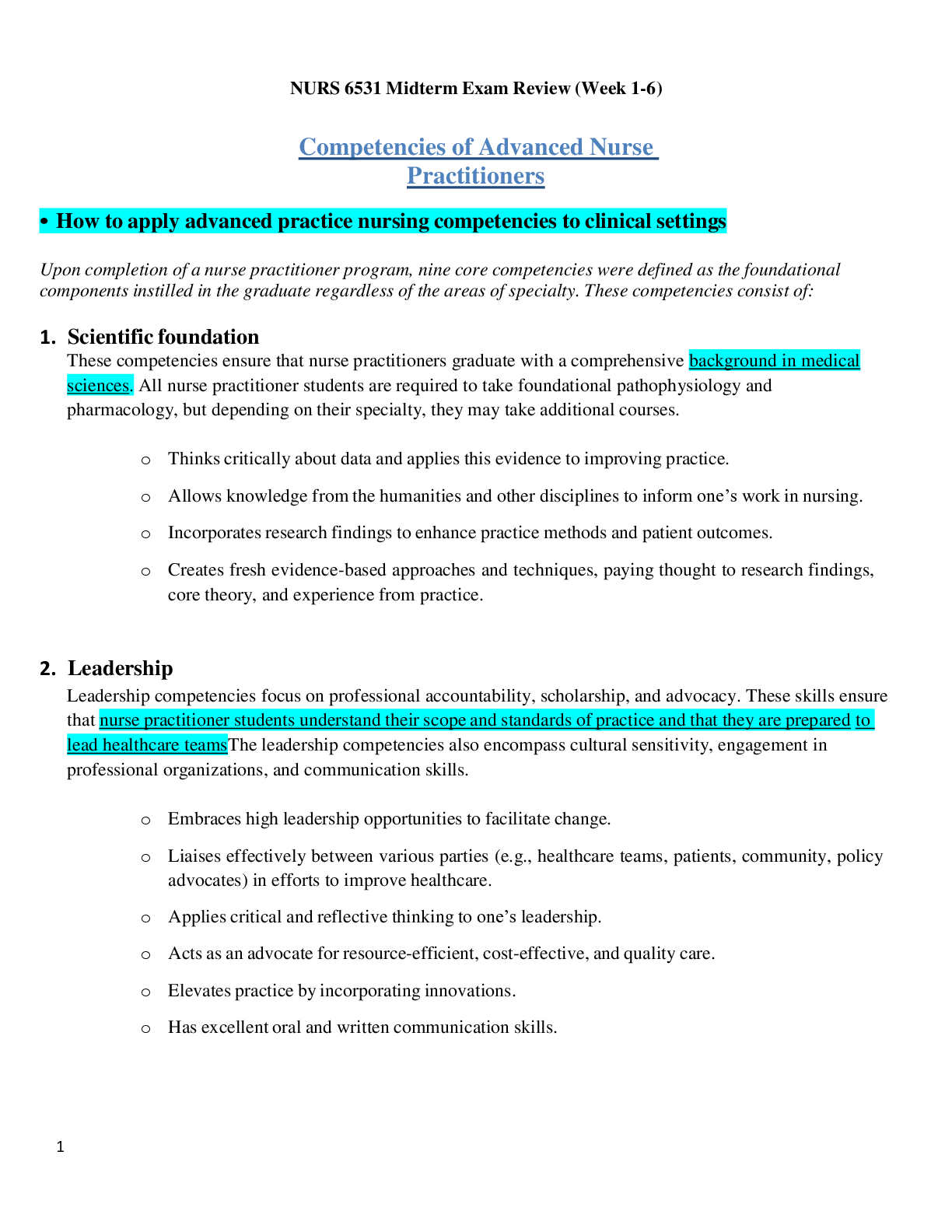
Buy this document to get the full access instantly
Instant Download Access after purchase
Buy NowInstant download
We Accept:

Reviews( 0 )
$13.50
Can't find what you want? Try our AI powered Search
Document information
Connected school, study & course
About the document
Uploaded On
May 04, 2021
Number of pages
66
Written in
All
Additional information
This document has been written for:
Uploaded
May 04, 2021
Downloads
0
Views
117

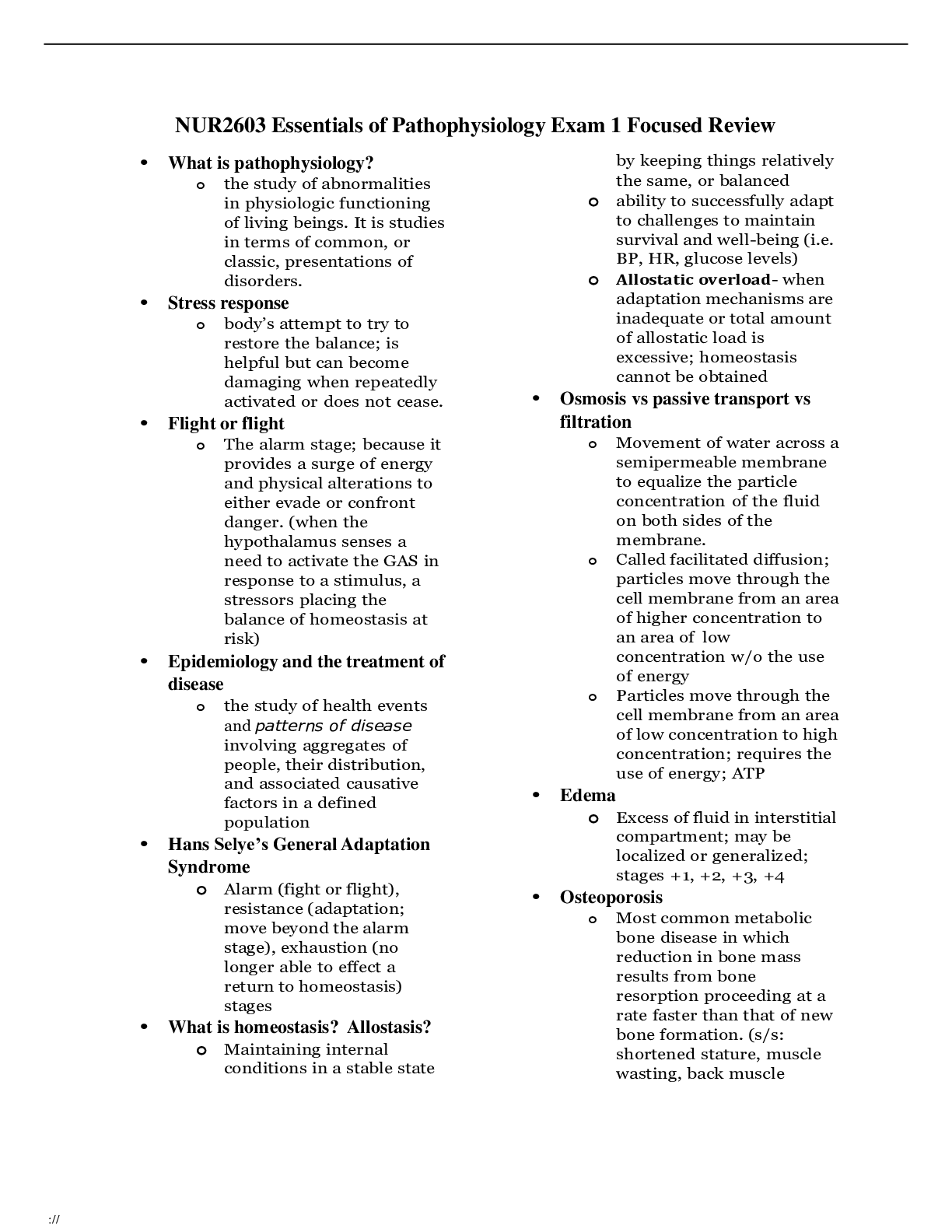
.png)


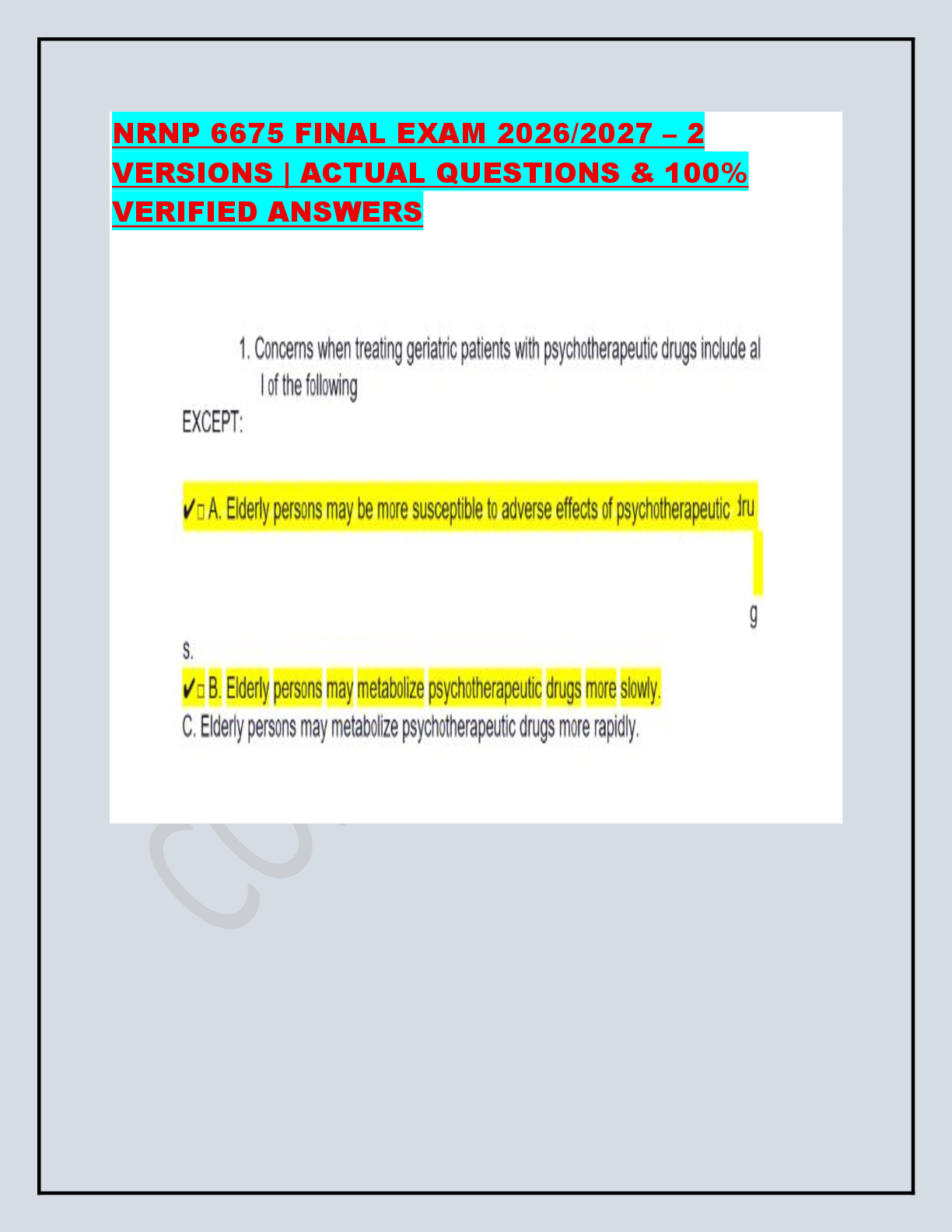

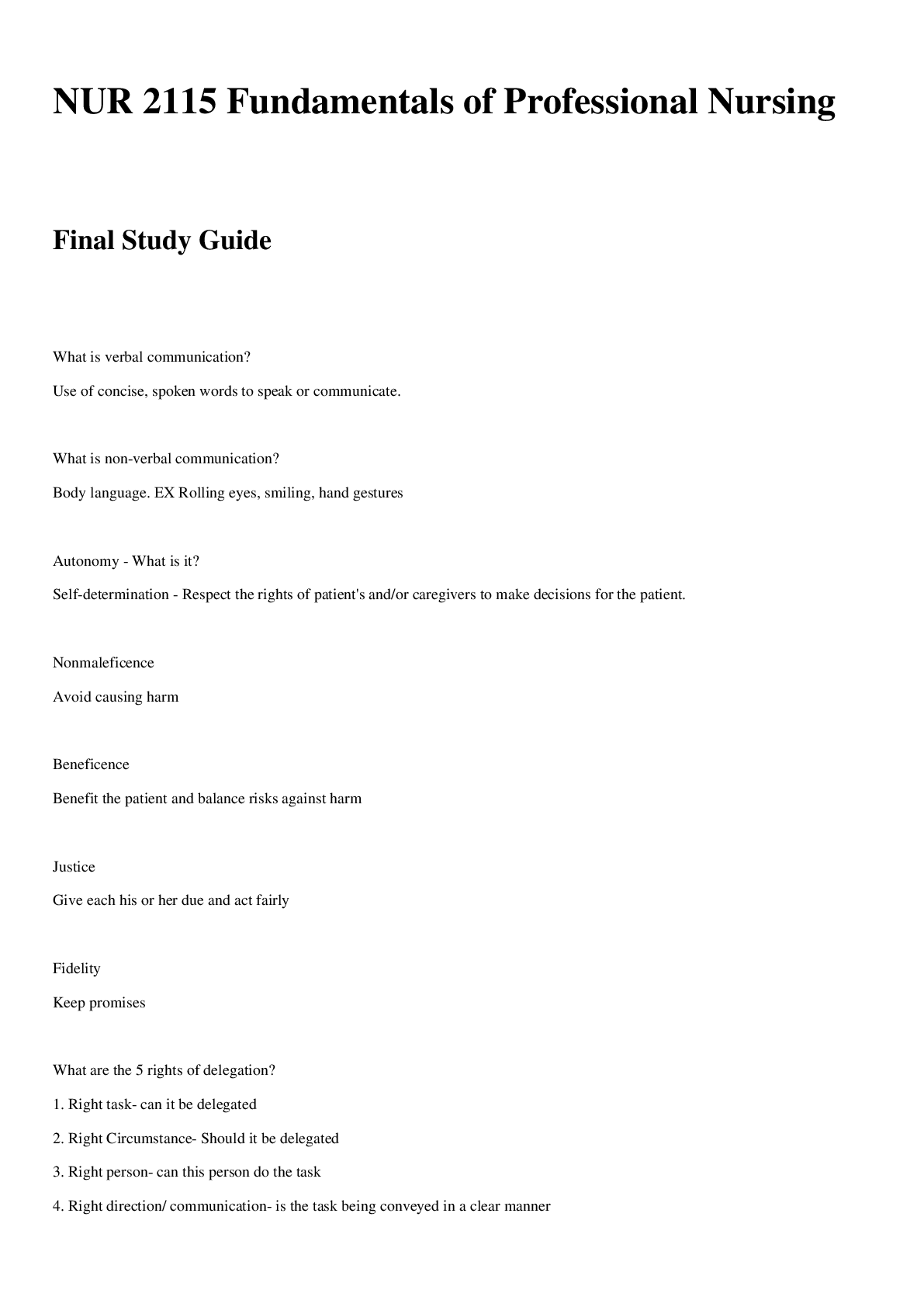
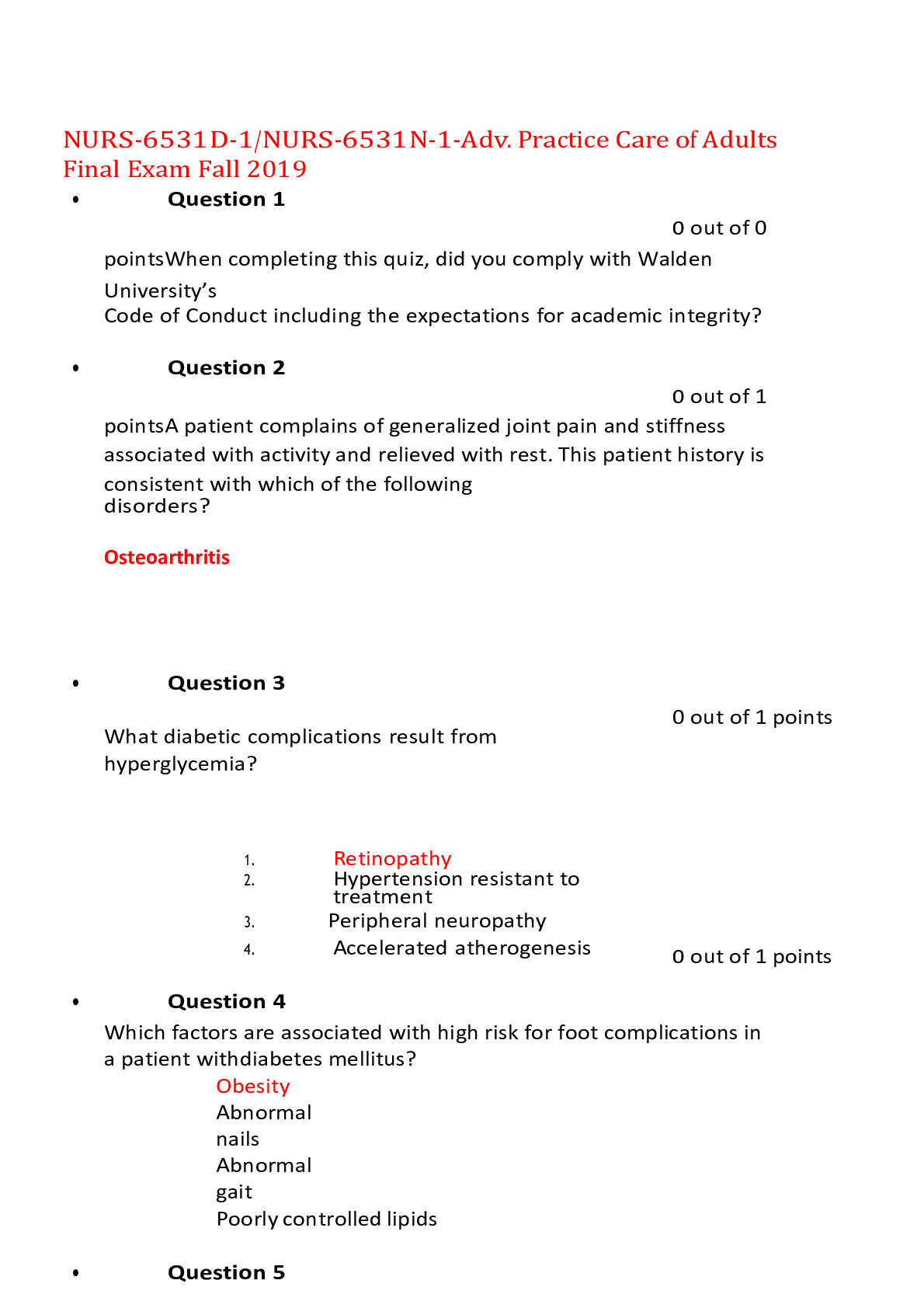
 JN21.png)

